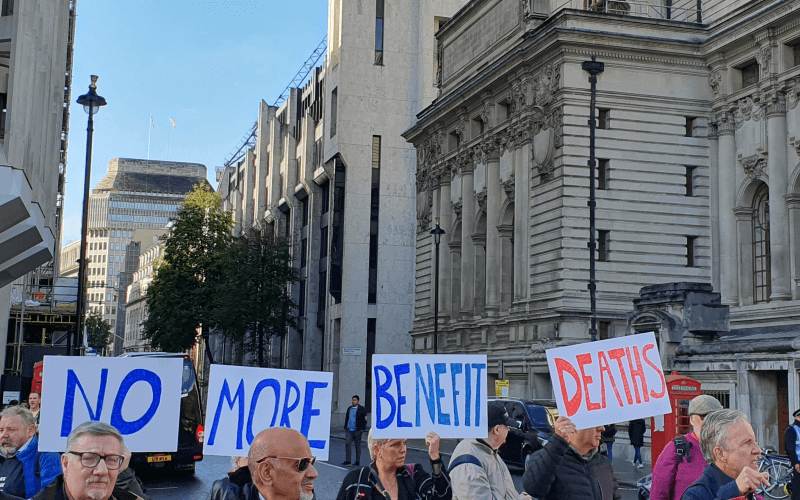The Department for Work and Pensions (DWP) has finally admitted that it carried out more than 30 secret reviews last year into cases of serious harm or deaths involving someone receiving universal credit.
Internal process reviews (IPRs) are only carried out if there has been an allegation that DWP’s actions “may have negatively contributed to the customer’s circumstances”, or if it is asked to contribute to a safeguarding or domestic homicide review or an inquest.
The figures will add to concerns about the working-age benefits system, two months after the start of the rollout of universal credit to the remaining hundreds of thousands of disabled people still receiving income-related ESA.
The PCS union has described universal credit as a “dangerously flawed system” in which “the most vulnerable continue to slip through its cracks”.
DWP previously claimed it was just a mistake that figures on how many IPRs into the deaths of universal credit claimants were carried out were omitted from the department’s annual report for 2023-24.
The report, published just after July’s general election, introduced the figures on page 80, stating: “The chart below shows the primary service lines relating to the customers’ cases accepted to IPR across 2023-24.”
But there was no chart in the report that provided that information.
Now, more than three months later, DWP has finally published the missing figures.
They show that 31 IPRs were carried out in 2023-24 into suicides, other deaths, attempted suicides and cases of serious harm involving claimants of universal credit.
They also show 27 were carried out into cases involving personal independence payment claimants, and 15 into disabled people who were receiving employment and support allowance (ESA)*.
In 2023-24, DWP staff referred 75 cases for a possible review, but only 53 met the criteria and were accepted for an IPR.
Despite repeated concerns being raised about safeguarding and the safety of the administration of universal credit, none of the main political parties mentioned the issue in their election manifestos.
In July, DNS described how repeated failures by DWP led to the death of a disabled woman, Nazerine Anderson, after her case was randomly selected for a “performance measurement review” of her universal credit claim.
Last November, another coroner wrote to the department after the death of Kevin Gale, to warn DWP that it needed to act to prevent flaws in the universal credit system leading to further deaths, after Gale took his own life after becoming overwhelmed by the application process.
And last month, DNS reported how a disabled woman left traumatised by the daily demands of universal credit took her own life just seven days after being told she would need to attend a face-to-face meeting with a work coach. Her inquest has yet to take place.
Thanks to a secret DWP decision, the criteria for when to carry out an IPR was weakened in April 2021 (see separate story).
Previously, whenever DWP became aware that a claimant had died by suicide it would order an IPR, even if there were no allegations that its actions had contributed to the death.
But since April 2021, after weakening the rules, DWP now only carries out an IPR following the suicide of a claimant if there is already an allegation that DWP’s actions “may have negatively contributed to the customer’s circumstances” and the claimant has “suffered serious harm, has died (including by suicide), or where it has reason to believe there has been an attempted suicide”.
IPRs are also carried out if DWP is asked to participate in a safeguarding adults review, a significant case review (in Scotland), or a domestic homicide review, or is named as an interested party at an inquest.
*Many claimants will have been receiving more than one benefit
The Department: How a Violent Government Bureaucracy Killed Hundreds and Hid the Evidence, John Pring’s book on the deaths linked to DWP and the years of cover-ups by the department, is published by Pluto Press
A note from the editor:
Please consider making a voluntary financial contribution to support the work of DNS and allow it to continue producing independent, carefully-researched news stories that focus on the lives and rights of disabled people and their user-led organisations.
Please do not contribute if you cannot afford to do so, and please note that DNS is not a charity. It is run and owned by disabled journalist John Pring and has been from its launch in April 2009.
Thank you for anything you can do to support the work of DNS…

 Young disabled people will ‘earn or learn’ or lose their benefits, Kendall’s unpublished comments suggest
Young disabled people will ‘earn or learn’ or lose their benefits, Kendall’s unpublished comments suggest Mirror backs columnist who claimed ‘millions’ of disabled people were wrongly claiming benefits
Mirror backs columnist who claimed ‘millions’ of disabled people were wrongly claiming benefits Channel 4 documentary on benefits was ‘atrocity’ and ‘insult’ to disabled people in poverty, say activists
Channel 4 documentary on benefits was ‘atrocity’ and ‘insult’ to disabled people in poverty, say activists